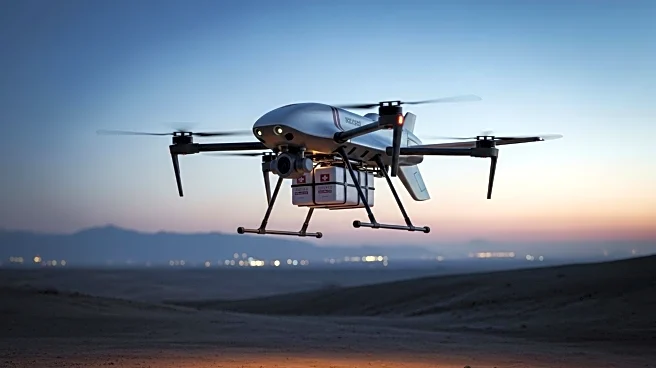What's Happening?
The Israeli military has implemented advanced medical technologies to treat soldiers wounded in the ongoing conflict in Gaza. Over 500 soldiers have survived serious injuries, thanks to innovations such as drones delivering blood units directly to the battlefield. These drones, known as Thor, can parachute blood units factoring in wind direction, which is crucial for soldiers experiencing severe hemorrhaging. Additionally, a portable device developed by the Israeli military and Inovytec separates oxygen from the air to ventilate wounded soldiers, eliminating the need for pressurized oxygen cylinders. These advancements have significantly improved survival rates compared to past conflicts. Dr. Galit Sivak, a civilian surgeon, has played a pivotal role in saving the limbs of 35 soldiers, including Nevo, a 25-year-old soldier who suffered severe injuries in an explosion. The proximity of Israeli hospitals to the battlefield allows for rapid evacuation and treatment, further enhancing recovery outcomes.
Why It's Important?
The use of cutting-edge medical technology in military operations represents a significant advancement in battlefield medicine, potentially setting new standards for treating combat injuries. These innovations not only save lives but also preserve the quality of life for soldiers who might otherwise face permanent disabilities. The collaboration between Israeli medical professionals and international experts, such as those at the Mayo Clinic, highlights the global exchange of medical knowledge and techniques. This development could influence civilian medical practices, as technologies and methodologies from military medicine often translate to civilian healthcare. However, the disparity in medical access between Israeli soldiers and Palestinian civilians in Gaza raises ethical concerns, as the latter do not benefit from these advanced medical systems.
What's Next?
The ongoing conflict in Gaza may continue to drive medical innovations as the Israeli military seeks to improve survival rates and recovery outcomes for its soldiers. The collaboration between Israeli and international medical experts is likely to expand, potentially leading to further advancements in battlefield medicine. Additionally, discussions around the ethical implications of unequal access to medical care in conflict zones may intensify, prompting calls for more equitable healthcare solutions for all affected populations.
Beyond the Headlines
The advancements in medical technology used by the Israeli military could have long-term implications for global military and civilian healthcare systems. The ethical considerations surrounding access to medical care in conflict zones may lead to increased advocacy for humanitarian aid and equitable healthcare policies. Furthermore, the psychological impact on soldiers, who carry both visible and invisible scars, underscores the need for comprehensive mental health support for veterans.









